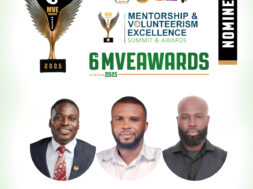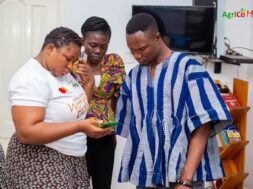Entrepreneurship is fast becoming the driving force for economic growth in Ghana and across Africa. With youth unemployment on the rise, more young people are turning to business creation as a way to secure their future. At the heart of this transformation are innovation hubs and support organizations like Duapa Werkspace, founded by Erasmus Mensah-Ackon.
Duapa Werkspace has positioned itself as a catalyst for change—helping young people acquire employable skills, develop entrepreneurial mindsets, and grow sustainable businesses. At the 2025 Annual Gathering of Hubs, Mensah-Ackon shared valuable lessons from his entrepreneurial journey, offering inspiration to aspiring business leaders in Ghana and beyond.
The Story of Duapa Werkspace
Duapa Werkspace is more than just a hub—it is a support organization that empowers the next generation of Ghanaian entrepreneurs. Through training, mentorship, coaching, and entrepreneurship support, it provides the tools young people need to face challenges, create solutions, and generate job opportunities for themselves and others.
The organization plays a vital role in bridging the gap between education and employment, helping young people gain practical skills in technology, business development, and innovation.
Lessons from Erasmus Mensah-Ackon’s Journey
Resilience and Thinking Outside the Box
According to Mensah-Ackon, resilience is the foundation of entrepreneurship. Starting a business is not for the faint-hearted—it comes with challenges that require innovative thinking. Every obstacle is an opportunity to brainstorm, re-strategize, and create something new.
The Role of Tough Times in Growth
For him, the toughest moments in business have been the greatest teachers. Difficult situations forced him to think critically, build solutions, and push forward. These challenges became stepping stones toward growth and success.
Mentorship as a Success Driver
Mensah-Ackon highlighted the importance of having a mentor. Mentorship provides guidance, motivation, and clarity, helping entrepreneurs avoid mistakes and remain focused. For many young entrepreneurs, mentors eliminate loneliness and provide encouragement during tough times.
Consistency and Building Your Brand
Consistency is another key to success. Mensah-Ackon advised entrepreneurs to keep doing what they are good at and ensure people know them for their craft. Building a strong personal and business brand creates trust and long-term recognition.
Entrepreneurship in Ghana: Opportunities and Challenges
Why Ghana Needs More Entrepreneurs
With high unemployment rates, the government alone cannot solve the job crisis. Entrepreneurs play a crucial role in job creation, innovation, and economic development.
Challenges Entrepreneurs Face
Despite the opportunities, entrepreneurs in Ghana face challenges such as limited access to funding, lack of mentorship, and infrastructural gaps. Navigating these barriers requires resilience, creativity, and community support.
Business Opportunities in Ghana and Africa
The continent is filled with untapped potential. Promising opportunities lie in:
- Digital economy – IT services, fintech, and e-commerce.
- Agribusiness – food processing, farming innovation, and exports.
- Creative industries – media, arts, and fashion.
- Education & EdTech – digital learning solutions.
Business Growth Strategies for African Entrepreneurs
Resilience and Adaptability
Learning to adapt in uncertain times is a skill that separates successful entrepreneurs from those who quit early.
Innovation and Problem-Solving
Creative solutions to everyday problems make businesses relevant and profitable.
Collaboration with Hubs and Communities
Joining hubs like Duapa Werkspace provides access to networks, mentorship, and shared resources.
Scaling Beyond Local Markets
Entrepreneurs should look at regional and international expansion to grow their businesses.
Duapa Werkspace’s Role in National Development
Mensah-Ackon emphasized that solving unemployment requires a collective effort. Local hubs like Duapa Werkspace contribute by offering training, mentorship, and entrepreneurship support. These young innovators, in turn, become job creators, fueling national and continental development.
Entrepreneurship Success Story: Erasmus Mensah-Ackon
From resilience and creativity to mentorship and consistency, the story of Erasmus Mensah-Ackon is a blueprint for aspiring entrepreneurs. His journey proves that challenges can become opportunities, and with the right mindset, local entrepreneurs can create lasting impact.
Practical Tips for Starting a Business in Ghana
For aspiring entrepreneurs in Ghana and across Africa, starting a business requires more than passion—it needs planning, research, and persistence. Here are some actionable steps:
1. Identify a Real Problem
Successful businesses often emerge from solving common challenges. Look around your community—whether it’s internet access, affordable food, or IT services—and build solutions people are willing to pay for.
2. Start Small, Grow Steadily
You don’t always need huge capital to begin. Start with what you have, test your idea, and refine your product or service before scaling.
3. Leverage Digital Tools
Digital platforms make it easier for small businesses to reach customers. Social media, e-commerce marketplaces, and mobile money solutions have transformed how Ghanaians do business.
4. Network and Seek Mentorship
Just as Mensah-Ackon emphasized, mentorship shortens the learning curve. Join entrepreneurship hubs like Duapa Werkspace, attend events, and connect with experienced business leaders.
5. Stay Consistent and Build Trust
Customers value reliability. Delivering quality consistently builds trust, which is the foundation of long-term success.
Entrepreneurship in Africa: A Continental Opportunity
Africa is home to one of the youngest populations in the world. This youth-driven energy, combined with growing internet penetration and innovation, makes the continent ripe for entrepreneurship.
Emerging Opportunities Across Africa
- Fintech: Mobile banking and digital payments are transforming economies.
- Agriculture: With vast arable land, agribusiness innovations can feed the continent and provide exports.
- Renewable Energy: Solar and clean energy projects are booming to meet growing power demands.
- EdTech and HealthTech: Online learning and digital health platforms are addressing critical social challenges.
The Role of Ghana in Africa’s Growth
As one of the fastest-growing economies in West Africa, Ghana serves as a launchpad for startups looking to expand across the continent. Entrepreneurial hubs like Duapa Werkspace are building a generation of innovators who can scale globally.
The Power of Community Hubs in Driving Change
Duapa Werkspace is a model for how local hubs can transform communities. By providing entrepreneurship training, mentorship, and co-working spaces, they help turn ideas into viable businesses.
Such hubs not only create direct impact but also inspire national development by producing job creators rather than job seekers. This aligns with Ghana’s broader goal of reducing unemployment and strengthening the private sector.
Final Thoughts
Entrepreneurship in Ghana is filled with both challenges and opportunities. The story of Erasmus Mensah-Ackon and Duapa Werkspace is a reminder that resilience, mentorship, consistency, and innovation are the keys to long-term success.
For young Africans, the message is clear:
- Don’t wait for the perfect moment—start with what you have.
- See challenges as opportunities to innovate.
- Surround yourself with mentors and communities that guide and inspire.
- Stay consistent and let your work build your reputation.
By embracing these principles, Ghanaian and African entrepreneurs can create sustainable businesses, drive national growth, and position Africa as a hub for global innovation.
Conclusion
The future of Ghana and Africa depends on resilient entrepreneurs who are ready to innovate, adapt, and create opportunities. Mensah-Ackon’s story through Duapa Werkspace highlights the key ingredients for entrepreneurial success—resilience, mentorship, consistency, and innovation.
Supporting local hubs and entrepreneurs is not just about business—it is about building stronger communities and driving Africa’s economic growth.

















